Alright, back for more SAO. No big preamble this time – I thought the last episode was pretty solid, and I’d like to see them build on it. I mentioned at the start of that episode that I hoped they offered some context for Kirito’s choices, and I mentioned in the middle of the first episode that I wanted him to have more motivation, and last episode went a long way towards answering those complaints – his feeling responsible for Sachi’s death, and her final wish for him to survive and win, seem like pretty solid motivation. I’m guessing he won’t actually swear off human contact, considering both Sachi’s admonishment to not blame himself and the simple fact that a show where Kirito interacts with no one would be pretty damn boring, but I would like to see the show more effectively and meaningfully portray his alleged anxiety. So far, it’s been limited to him looking nervous for a minute or two before proceeding to be charming and commanding for the rest of any given episode, and if it’s actually supposed to be a character flaw, it has to have, you know, meaningful repercussions.
Alright, I guess that’s my Nice Job and Needs Improvement breakdown for last episode. Let’s Sword Art Online!
Episode 4
0:05 – Late February, now? Man, time is flying in this show. I’m aware it’s a result of the source material’s format, but it certainly doesn’t lend itself to focused storytelling
0:09 – What did I say, SAO. NO KIDS, NO PETS
0:31 – Jeez, playground politics really do reign supreme in this world. Which, if they’re actually addressing in a more than subconscious way, does play nicely into the imperfect escapism of this MMO world. Even if you play games because you want your “worth” to others to be entirely a reflection of your competence at the game, when you actually live in this world, your “social worth” and how well you can relate to others becomes relevant whether you want it to or not
2:12 – Pretty
2:37 – Nice animation in this scene. This show has a very crisp visual style – I’m personally more often a fan of somewhat impressionistic, loose animation for stuff like this (like how Space Dandy does it), but this style is being executed quite well here
3:04 – Oh no the bird thing
3:19 – IS THIS THE END?!?
3:30 – lolno hi im kirito
3:36 – Oh come on. This is a fanfiction entrance
3:45 – More lonely kids. Pretty consistent refrains in this show
4:23 – So yeah, Kirito just isn’t actually antisocial.
4:48 – “Worth through game competence.” Like Shirou’s complaint at the beginning of Log Horizon – people only wanted him for his knowledge. Well, some people are perfectly happy to be wanted for their knowledge
5:24 – THIS SOUNDS LIKE A QUEST FOR A HERO. Obviously, since it was a one-off short story, this was pretty much bound to happen, but… yeah, Sachi’s death clearly no longer a part of the story. Kirito is a generic dude with a black trenchcoat again, not the Kirito who’s defined by the death of a particular character. The events aren’t building off each other, and thus a character story is not being told
Which is awkward, since last episode basically burned a ton of other narrative bridges to make this a character-focused story
Which means it’s now basically just an adventure for its own sake. Which is reasonable, though not something I generally find the most compelling – I tend to consider plot the raw paint with which we create portraits of humans or explore compelling ideas. And even a plot-focused story is only improved by consistent character arcs and ideas
5:52 – For a second I thought the show was gonna make me eat my Sachi-related words
6:34 – That guy’s head is HUGE. Nice to see these two were able to get over their little fibs from the first episode
6:47 – Friggin’ creepers
7:05 – Gotta be valued the way you want to be valued
8:07 – Kirito’s got this. Still kinda annoyed Sachi’s a non-factor now. It’s like this guy is just a new, flavorless character
8:48 – That’s an interesting detail. It being public knowledge makes me think that somebody’ll be forced to kill someone else and thus become a pariah, or something
9:04 – Yes we know. Is he thinking that the player indicator’s a lie, because he “killed” Sachi and the others but still has a green hue? Maybe? It’s weird to know these were all random short stories, and so I’m not sure how much I should assume is subtlety and how much just isn’t there
9:28 – Kirito a dreamboat
9:31 – WHY’D SHE CHANGE THE SUBJECT??? Oh anime
9:44 – They can’t help themselves. Kirito too charming
10:48 – Another cute detail. Although, haven’t these people been in this game for well over a year now? Is what skills even do also hidden information?
11:31 – Silica’s insatiable
11:50 – Hey, there’s a Sachi shoutout
Man, this episode’s just… really boring. I don’t care about Silica, I don’t care about this generic version of Kirito, and this plot seems totally inconsequential. It’s not exciting on a purely aesthetic front (which, if I’m being honest, is basically all I get out of stuff like Kill la Kill), and it’s not really exploring the ideas of the earlier episodes. It’s just kind of existing
12:20 – DID YOU SAY “BORING?!?!?”
13:31 – Did you set this up yourself Silica
12:46 – TIRED OF YOUR SHIT
13:19 – Oh I can hardly wait for that part
13:46 – Wait, a literal beating? Jeez, this got heavy quick
14:08 – Pretty. So was this written after the cousin was actually a character? Because it’s kind of strange having this be the explanation, give we don’t actually know any of this stuff
That said, I definitely like the show giving some context to Kirito’s escapism and videogame excellence. A grandfather who doesn’t respect you and a semi-sister you feel inferior to are perfectly good reasons to want to feel strong
14:44 – Goddamnit Silica it’s just one thing after another with you
14:46 – Not rapey enough, apparently. Classy
15:27 – The flower represents a flower
16:08 – YEAH I’M PRETTY STRONG
16:26 – Those rogues!
16:39 – Yeah, there’s a good use of it
17:21 – OH SHIT IT WAS ALL A CLEVER RUSE
17:57 – Oh man, brutal. But frankly, not particularly different from how trolls tend to always justify their heartlessness – “chill out bro, it’s just the internet.” “You shouldn’t take this stuff so seriously.” Personally, I think the internet just offers a field of low consequences for people to be who they truly are – when people say “I troll because it’s just the internet,” I hear “I’m a bad human being online because I know there I can get away with it.” Obviously the internet will always dehumanize human engagements, but when you step away from your own humanity, you are making a deliberate choice of your own volition. The internet lets you put on all kinds of faces, including the monster that’s always been inside you
Anyway, I like her defense. Pretty much the fastest way to make me find a two-dimensional villain compelling is to liken them to an internet troll
18:28 – That’s right fuckers. You barked up the wrong protagonist
18:39 – God’s gift to gaming
19:33 – Oh my god, I know this feeling. Trying to grind some low-level area and some endgaming asshole decides to make it his personal warzone. MY SPELLS, THEY DO NOTHING
19:49 – Pretty great to hear him kinda acknowledge his arbitrary power
20:10 – Those spurs are +5 to dramatic entrances
20:55 – Don’t bait me with the show you’re not actually giving me, SAO
21:10 – So Kirito completely understands all the stuff I’ve been talking about. How strength in videogames is an arbitrary proxy, an escape from a world where strength is measured in things you can’t conveniently grind. Huh!
And Done
Well, that was okay. That ending speech by Kirito was heartening – it demonstrates the show is well aware of the more interesting thematic conflicts it could be playing with here. The episode itself wasn’t really that interesting, unfortunately, though the idea of Kirito as an overpowered bounty hunter is cool I guess. If this show is going to get caught up in a lot of vignettes, they really have to be compelling on their own narrative merits, and this one was pretty lukewarm. Not many shows can do what Cowboy Bebop does and get away with it, and Bebop actually had some very consistent characters at its center… along with, you know, fantastic direction, great scripts, a creative aesthetic, a brilliant soundtrack…
Okay, sorry, unfair comparison. This episode was just kinda boring, no need to pick on it.

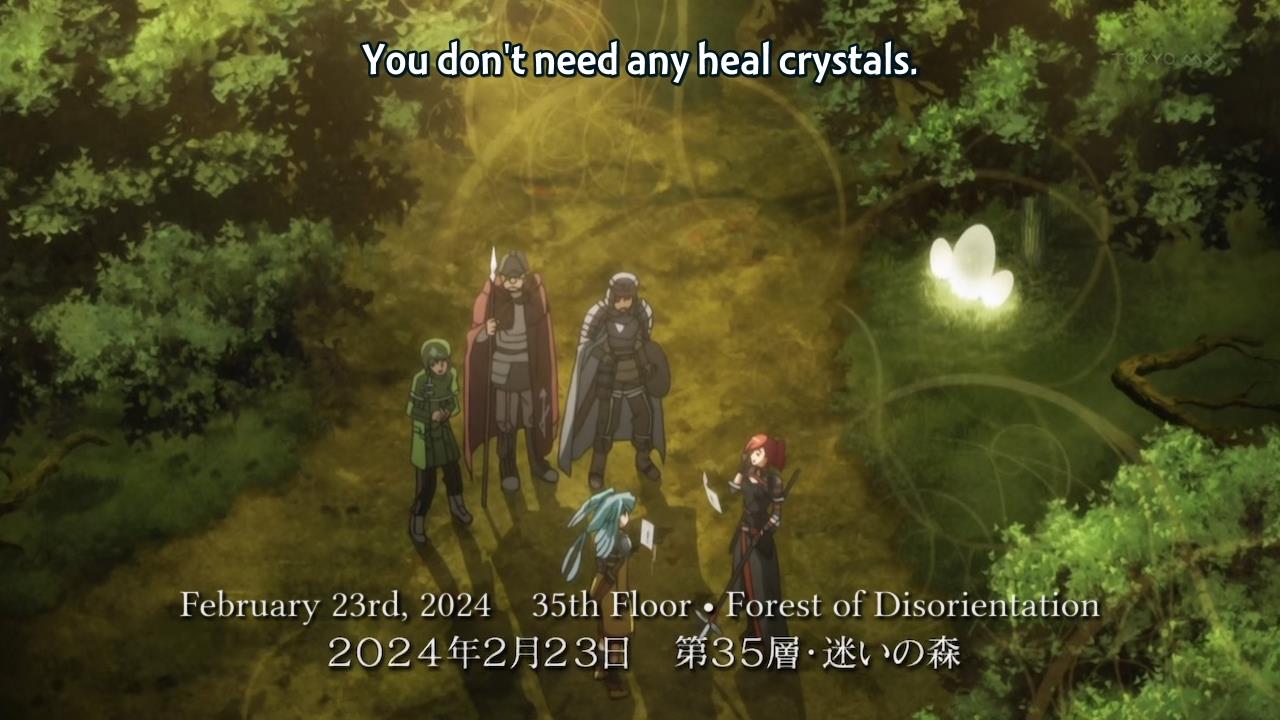

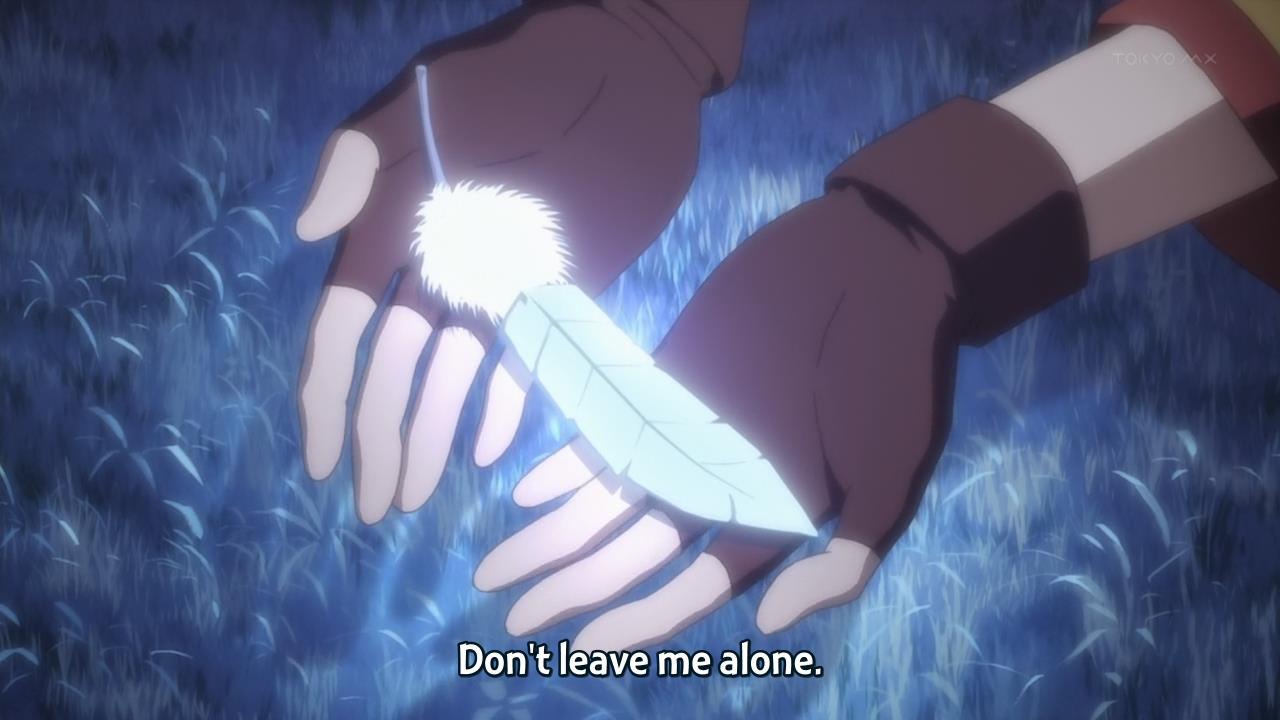
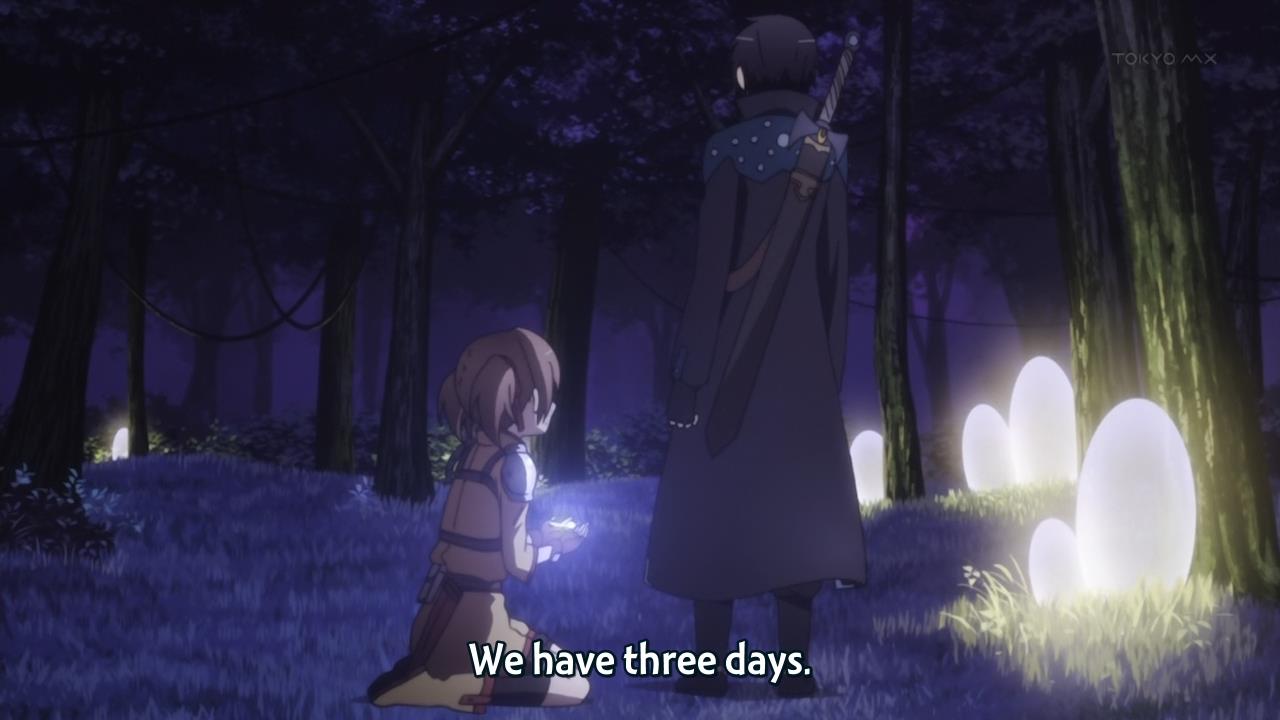
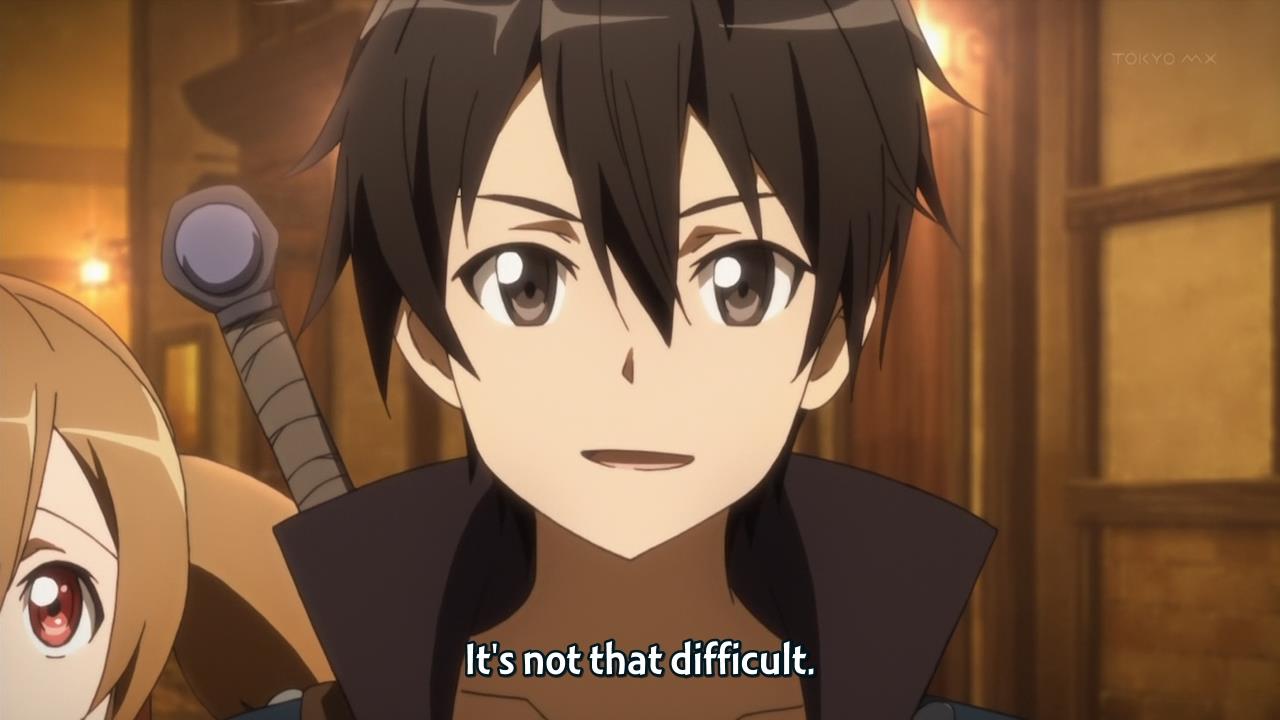
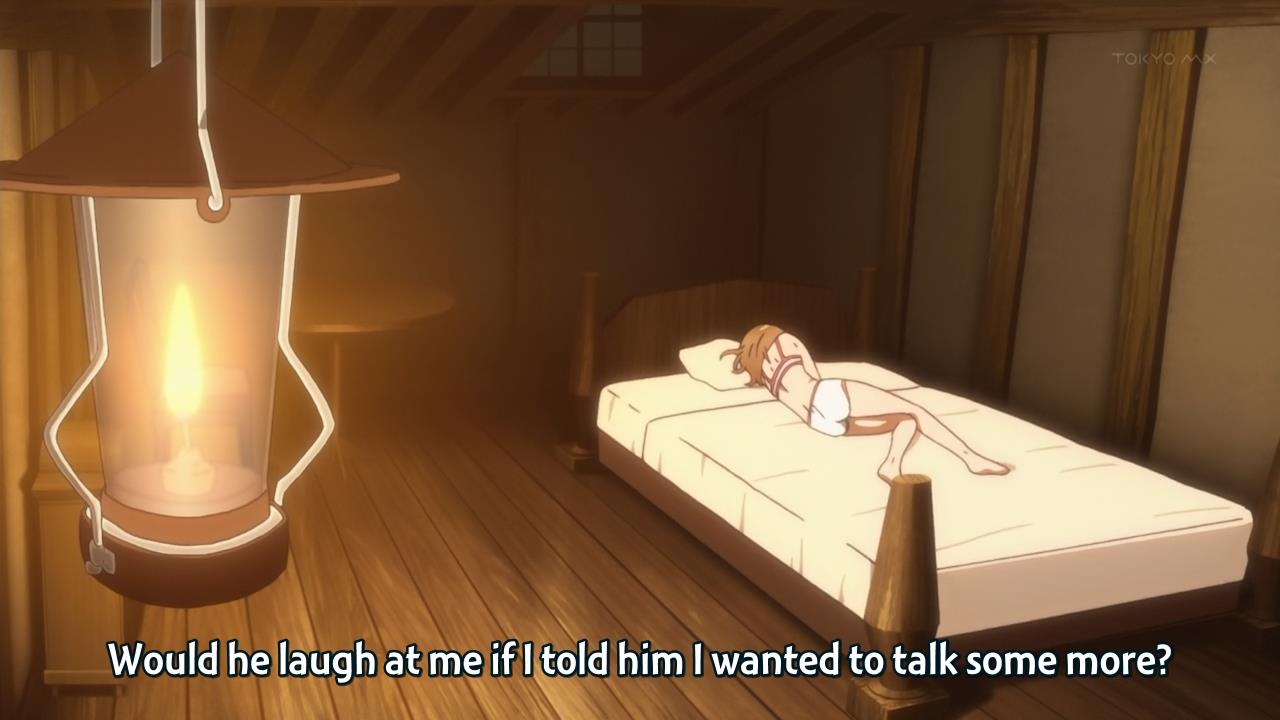
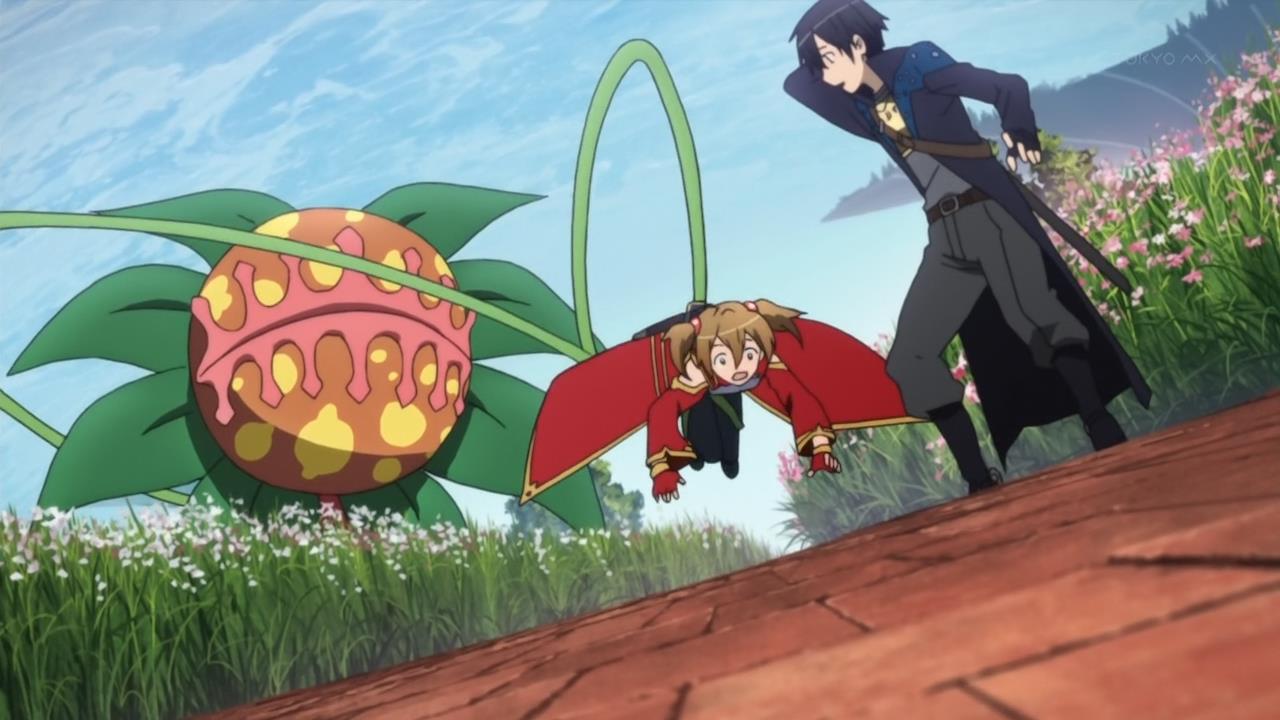
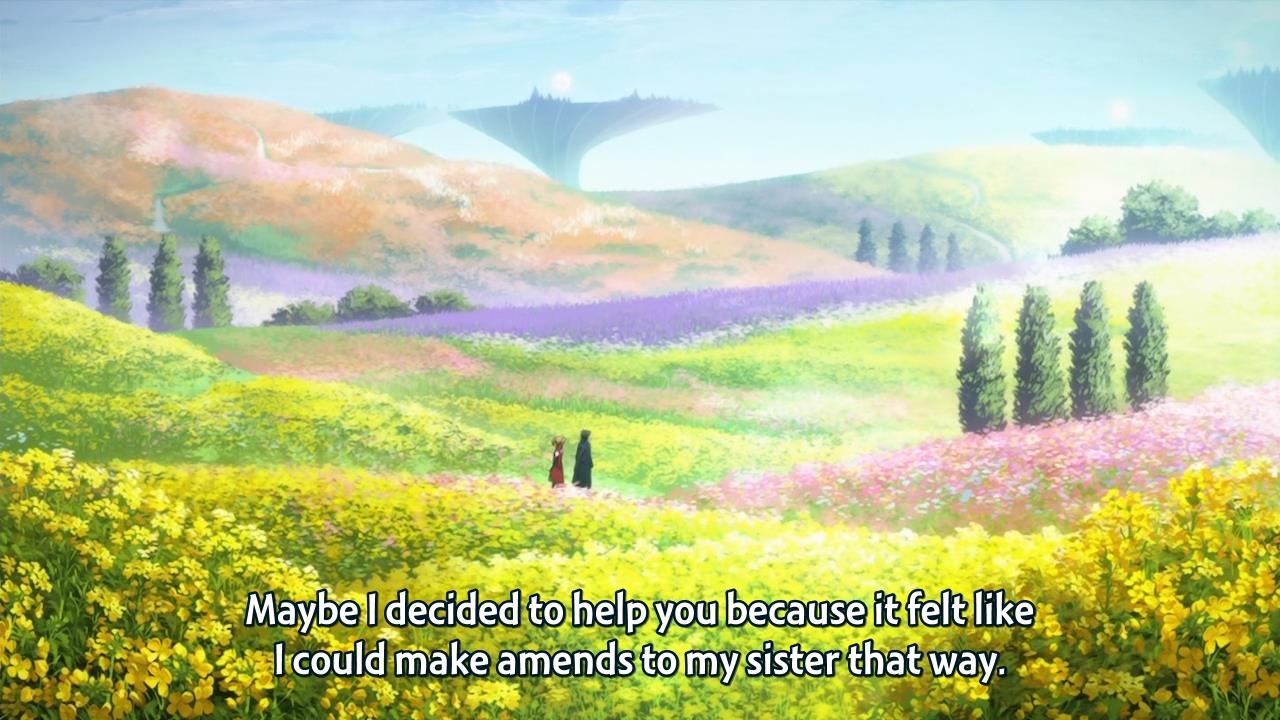
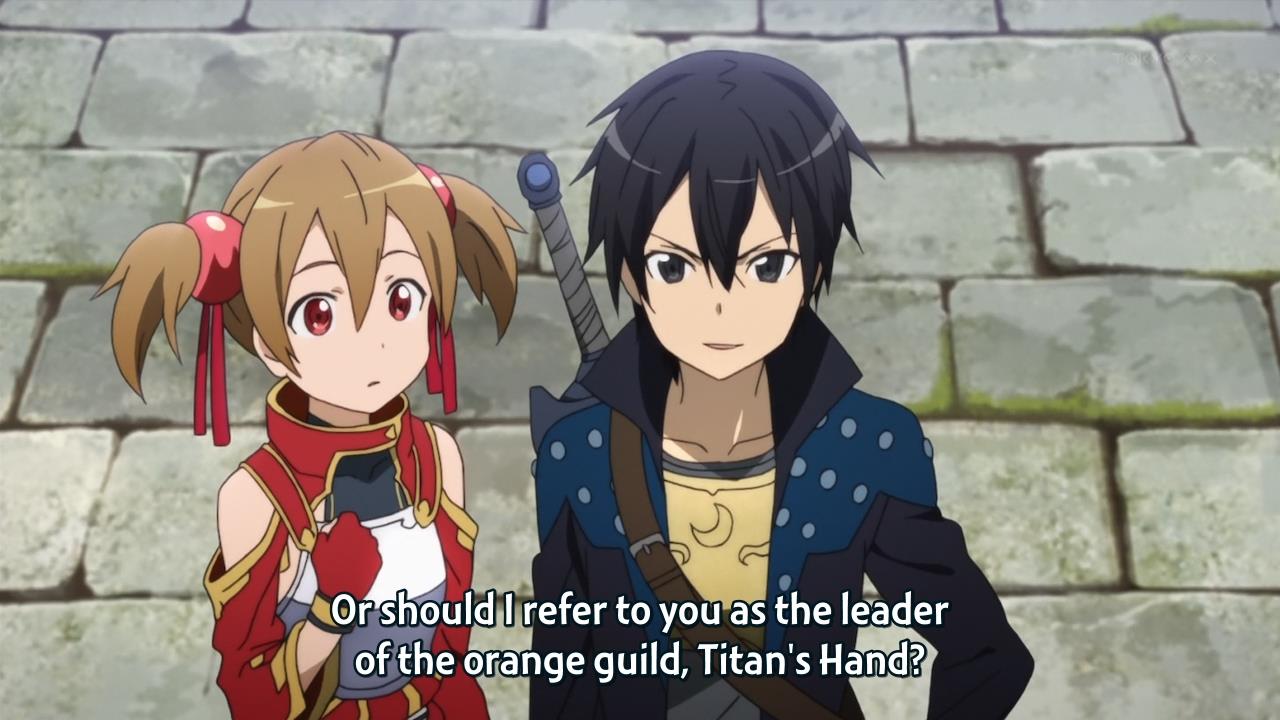
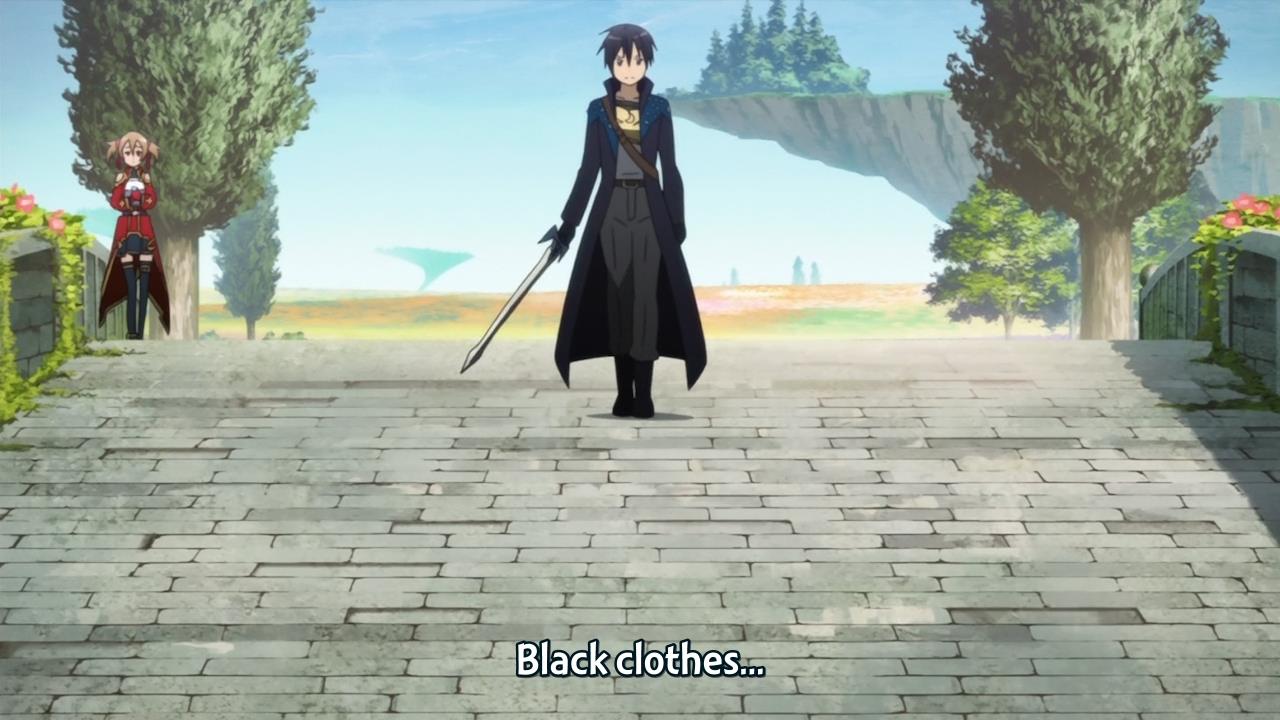
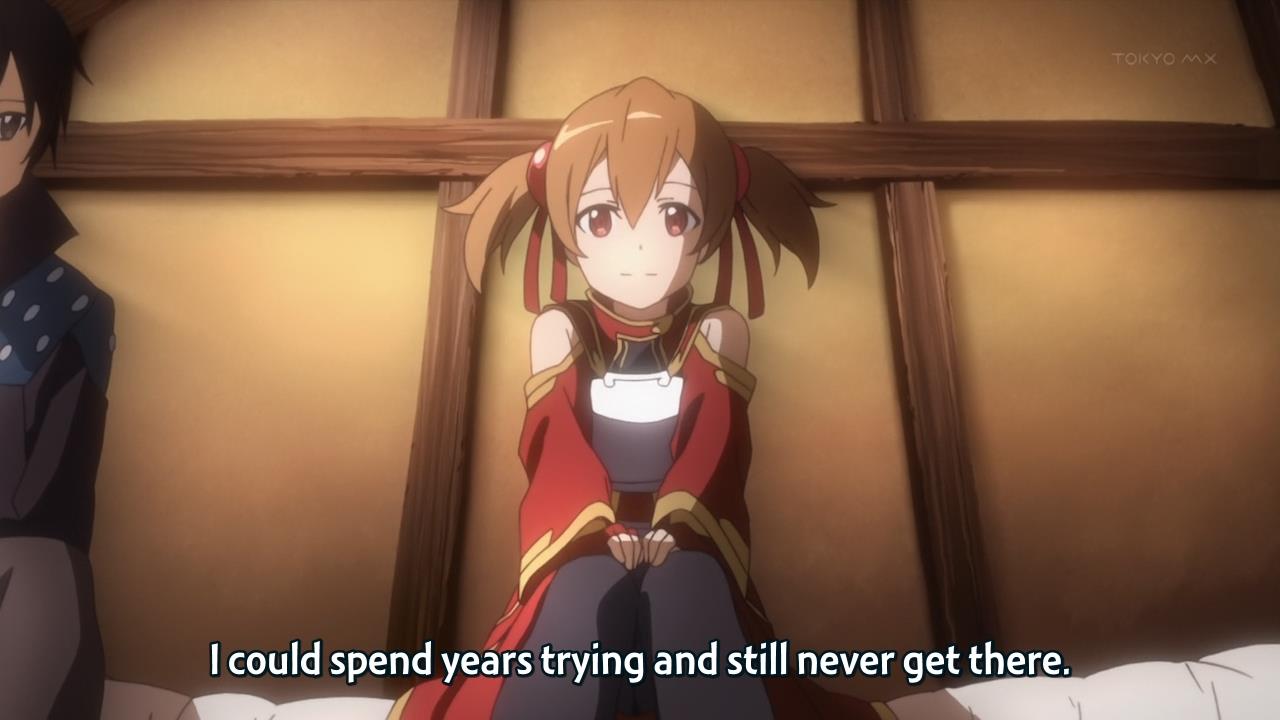
Trust me: in hindsight, the show isn’t aware of jack. It’s just kinda blundering into this stuff while it confusingly stumbles towards the next girl-of-the-week.
Anyway, back when I saw this episode I liked it. The ending moment was also quite badass too. I think one of the things that turned me so sour towards SAO (I am VERY sour towards it) is exactly the same promise that you see in it, and its being left completely unfulfilled (from my point of view at least).
Well, blundering or not, at least it engages with this stuff in one way or the other. The discussion on videogame escapism certainly isn’t a one-time thing, certainly not in the first fourteen episodes. Later? Maybe. Though that’s a discussion for later episodes.
The unfortunate thing is that Silica is completely helpless most of the time; it makes the character interactions “kawaii” and nothing but that. I don’t think any female SAO character was able to evoke respect from me(save for Asuna for about 600 seconds).
Telling? I think so, but I’m not sure how to process this thought.
Well, but it isn’t really making a reflection on video game escapism. Surely not in the same way a series like The World God Only Knows for example does, even in the middle of all the romcom shenanigans. The general feeling that crept up me was that it was just another way to have the viewer identify with Kirito – Kirito is socially awkward and feels like games are better than real life, just like YOU, our dear viewer! There’s never the feeling that this assumption is challenged though (which, god forbid, might make people THINK). I won’t go deeper than this though because it’d get dangerously spoiler-ish.
Compare Accel World, from the same author, set in the same world some 30-ish years later, and yet another power fantasy (though one I enjoyed more as it had at least better action and a more original idea). In that case, too, the point is finding a way to make video game skill applicable to success in real life. But it never goes beyond that. It never criticizes the lead’s social ineptitude, it never makes him grow: rather, it throws loving girls and victories in his lap, for the sole merit of being good at games.
Well then, at least I can enjoy what it accidentally talks about!
That’s a positive attitude allright :D. Go for it!
The problem here is that Silica is a non-character, and Kirito has been completely divorced from his own narrative arc, such as it is. Well, to be fair to the animators I think they tried to make it seem like Silica was cheering him up? It happened a bit too fast to be believable though. It also tries to deal with the theme of “false strength” as directly tied to video games (which is actually a pretty important theme throughout the series, despite what anyone might tell you), but it’s more of an afterthought here, that gets told rather than shown. And almost contradicted by what actually is shown, where it turns out that fake video game strength is actually really useful.
All around just kind of a boring episode. I would say it’s one of the low points of the series.
Yeah, Kirito really just monologued the only interesting element here – it certainly wasn’t demonstrated by the narrative, where Kirito was both awesome at the game and completely socially capable. Guess I’ll see where they maybe go with that.
It’s actually a bit worse than you thought: this story was in the same novel volume as last episode’s (it actually precedes Red-nosed Reindeer in the publication). It would’ve been quite easy to add some continuity. And indeed, the events of Red-nosed Reindeer are referenced in passages published earlier than it, so Kawahara should’ve had it in mind.
But I guess this probes at a greater question: to what extent is it realistic or effective to make a character’s tendencies and actions hinge on a specific “defining” event or trait? These are two separate questions, for while it may be unrealistic (in that most people in real life might not have such a defining quality or event), it may be necessary to effectively characterize a fictional character. It’s this distinction that I want to probe at. It strikes me that having Kirito effectively move on from what happened to him in last episode could be realistic, but at the same time, if he was just going to move on, then why tell the story at all?
So I guess it’s a matter of narrative scarcity. We don’t have time to talk about that many irrelevant events. If something like Sachi dying happens in a story, it should have a measurable and lasting impact. Otherwise, what’s the point?
Now, I think Kawahara makes a clinical mistake in structuring this story. Throwing in the twist that Kirito was using Silica to get at the criminals? It’s too little and too late. The rest of this story so far doesn’t connect with Kirito as we know him, and certainly from an anime perspective, where there is an expectation of sequencing, it really falls flat. But even outside of that, I can think of at least a couple ways this story could’ve been more interesting. Imagine, for a moment, we start with Kirito. He’s alone and isolated despite taking part in some of the front-line clearing efforts on occasion. He sees the GM of Silver Flags making an appeal to people, asking for help, as his guild’s been all but eliminated, but no one really gives him the time of day. Kirito’s seen a guild wiped out before. He’s seen people die. He has good reason to take this up, to be personally invested in rooting out the perpetrators.
That’s a story I would’ve liked to see: Kirito feeling that righteous indignation and the personal sense of responsibility by proxy. Those feeling drive him to act, but then he comes upon Silica, whom he must’ve been watching from a distance given her proximity to Rosalia. He knows he can use Silica to get to Rosalia, but to do so puts Silica in danger. This requires some moral nuance, and it would’ve been great for Kirito to show some indecision or consideration on this point. He could easily decide that he’ll do everything in his power to keep Silica safe while still using her as bait. That would play out predictably. He could decide to go get the feather by himself and not involve Silica any further. That would put the onus for growth and conflict on Silica, who might not feel at ease sitting and waiting for someone else to save Pina.
Close attention should be paid, I think, to how a story treats decision-making. Here, there is almost no focus whatsoever on decision-making. Kirito has already decided to find Titan’s Hand, and we’re not privy to his decision to use Silica, either, until well after the fact–nor is this decision questioned seriously. What I’ve outlined above is more of a reimagining of this story with a focus on decision-making. That Kirito shrugs off Titan’s Hands attacks tells us a little bit about his character–that he can be cool, even icy, at times–but without any focus on his decision-making, Kirito has no real avenue for growth. This is in contrast to Red-nosed Reindeer, which at least prompted Kirito to examine his selfishness and weakness–to question his own decisions–in retrospect.
Great breakdown of the storytelling choices involved here. You’re right, real people are very complicated, and the necessity of making story events “relevant” is basically a concession to the shorthand required for telling stories in the first place. In order for us to understand characters as people, their actions have to be meaningfully representative of the kind of person the author is attempting to demonstrate to us – they can’t just get over things in ways the narrative isn’t interested in exploring if it raises those points of character articulation and development in the first place. This is particularly true of a story like this, which by necessity must define characters through a series of broad, meaningful strokes – if those strokes clash with each other, the protagonist becomes a cipher.
And your proposed version of this episode sounds far more compelling than what we actually got – as you say, your version focuses on the choices that reflect meaningfully on these characters as existing and evolving people. This here was just a vignette, but your version would actually contribute to a larger narrative.
You’ve also reimagined this story being told from the perspective of Kirito. The story rarely stays inside Kirito’s head, despite what the first three episodes might lead you to believe. The story is much more about other focus characters reacting to Kirito. For example, this entire episode was told from Silica’s perspective: we never a single thought from Kirito, or even a scene where he’s alone. I’m not sure why the author chose to do that, but I think it’s important. Kirito is usually examined through what his actions look like to others, rather than through his internal struggles (which, as you say, may have been more interesting).
Personally, I’m convinced that the author is in love with Kirito. Not that he’s necessarily gay or anything, but he just really wants to hang out with someone like Kirito. Which is subtly different from wanting to be Kirito.
Yes, you’re right, I have. Still, even from Silica’s standpoint, there’s a lot that this story could’ve done yet chose not to do. Silica’s perspective doesn’t give us any unique insight into Kirito. This story takes place 2 months after Red-nosed Reindeer; it would’ve been a good opportunity to examine dissonance between Kirito’s outward behavior and his state of mind. Using an external POV character makes us as readers try to figure out what Kirito is feeling or thinking, rather than having that hand-delivered to us through narration. It can be a very effective way to characterize someone subtly. I just don’t think Kawahara leveraged that position to the fullest.
And we can question how Silica is characterized, too. What impact does she have on Kirito? Not much in this story. She is a device, a convenient character to have involved so that the plot of finding Rosalia can advance. She may have learned something from having lost Pina as a result of being stubborn and childish, but that’s not a lesson that reflects back upon Kirito. A tighter thematic presentation would’ve had Silica’s growth and development be something relevant to Kirito, too. That way, Silica becomes an avenue for Kirito’s personal growth as well. Something about Silica coming to terms with the death of a companion, even just a player’s pet like Pina, would’ve struck a chord in Kirito.
But, that’s not what Sword Art Online is. It does not seem interested in Kirito struggling against himself or growing. As long as the principle conflict is so external, well, you know what you’re going to get. As you said, it’s about being an audience to Kirito being cool and awesome and whatnot.
I’ll wait for the moment you realize Silica is nothing like Kirito’s cousin-mouto and he just says words that might have an inkling of thought behind them but are never followed up on.
…wonderful.
Welcome to light novels, or books such as R.A. Salvatore’s and other fantasy books for YA in the west 20-10 years ago. It’s excarberated by being an LN adaptation (on which I’ll talk soon™), but yeah. It’s mostly there so the character would be able to brood and so chicks could tell him he’s not so bad, in LNs. Well, and so he’d be able to be somewhat of a dunce when all the girls swarm over him. As I said the other day in Baka-Raptor’s review of the show, the original format of the book is actually the only real reason Kirito and Asuna got to be together, heh.
Yes. This show has all the production values. Yuki Kaijura soundtrack to boot.
More or less everything that happens up to episode 8-9 or so will be episodic and vignette, but things from then on will refer to things that had happened. post-Sacchi Kirito will return, around that mark. Yeah, not the best, but partially born out of the way the books had been written, her effect on the story currently is just to explain why he’s not with a guild. Then again, well, you’ll see.
Some of it will get discussed in episodes 5-6, which had been written way later, and some of it, most of it, in the GGO arc. It’s sort of funny, how this sort of thing is major, and majorly interesting, it’s the real death-game and social aspect nature, right? But he only left a couple of words for this in the first book, and only truly returned to it considerably later, realizing he’s got a thick thematic vein there, which he’s done nothing with.
No. Aincrad was written before the cousin was introduced.
As for the show structure, episodes 5-6 are one story, with interesting themes, and interesting socialization of in-game, and how in-game rules affect relationships (very Log Horizon), but I still liked it less. Episode 7 is a vignette for how cool Kirito is, and episode 8 onward gets us back to the main plot.
Jeez, most light novels do that to their characters? That’s terrible! I’m telling you, everything I’ve heard and read about light novels just gives me the dimmest possible impression of them.
5-6 actually do sound more like my kind of story, though. Guess I better get to it!
Yes, light novels are one of those magical mediums that make a story worse just by being told through that medium.
@”Because it’s kind of strange having this be the explanation, give we don’t actually know any of this stuff”
and
@”No. Aincrad was written before the cousin was introduced.”
It does seem intentional and it does feel like they had some idea beforehand what they were going to do with that character. While she isn’t introduced to the audience, I don’t think she needed to be introduced fully at this point. It pointed out how disconnected these characters are from the outside world and how they may never survive SAO for the audience to ever meet Kirito’s family outside of the virtual world. He makes amends (in his mind) by helping Silica, because there is a chance that he will never make it out of the game to make amends to his sister. Kirito is only one person who lives with these burdens; but most others are struggling in the same way. While they struggle to survive and live inside the world of SAO, they all have lives outside the virtual world that are being affected as well.
The anime slightly rectifies this by having a vital ten second character awareness impression of his little sister at the beginning of the show. He may indeed feel “inferior” to his sister because she is shown as someone who is strong and seemingly her life together, going out for practice instead of sitting in front of a computer all day. The fact that she even does knock to let him know she is going out shows that, at least as family, she does care about him.
By also acknowledging characters who exists outside the virtual world, it does raise the question of the turmoil the family, friends and affected parties are going through seeing the people they know unconscious. You can only imagine the suffering they must be going through when they have no real idea what is going on and if these people will ever wake up, if they have not already died. At the same time, it is only something you can imagine and speculate, because no one inside the game has any idea what is going on in the outside world.
It is a small detail, but it raised a lot of strong questions that continually pester to be asked. I couldn’t help but constantly put myself in the shoes of this unknown little sister character through the rest of the series because of this scene. The idea that her older brother was suddenly ripped away from the family life (and imagining how heartbreaking that is) and that Kirito may never be able to make amends to his sister for any past regrets and never make amends for disappearing so suddenly (and I bet he can only fathom the repercussions being caused by his practical “death”). All Kirito can do is fight on and try to work on escaping Aincrad.
That’s not even his final Black Swordsman form.
The main problem I have with Rosalia’s trollish reasoning (dying in game doesn’t mean dying in real life) is the lack of alternative ways to exit the game. If the threat of dying in real life were not real, why do people disappear from SAO only when they die? If I may spoil a bit of exposition from episode 13, it’s mentioned that a majority of players collapsed in the first hours of the game because their real bodies were being transported to hospitals. This is the only case shown to us, aside from in-game death, where players are shown to be “offline” from SAO. If the real world were to figure out that people actually weren’t being subject to death by head microwaves, people would be disappearing through means other than getting killed. And certainly, a massively multiplayer online hostage situation would not last a full year and a half before someone figured out that the computers were bluffing.
There have been many worldbuilding aspects throughout this show that I admire and wish to see development from, but those all come secondary to maintaining Kirito’s power fantasy. Not that power fantasies cannot be correctly executed from an entertainment perspective, but there’s a conspicuousness to how obviously illogical/weak/crutched Kirito’s opposition is. Rosalia, unfortunately, is just the tip of the iceberg.
Rosalia’s reasoning is simple enough to explain: self-delusion. Like all PK groups, she would have started out robbing people for money, but sooner or later something happens. Someone gets angry, fights back, gets killed. At that point she (and others in the group) can decide: (a), killing is wrong, I can’t do this anymore; (b) killing is awesome, I want to kill more people; or (c) this is just a game, I haven’t killed anyone. Presumably whatever gains there are to be gotten through her system are worthwhile enough for her to reason herself into (c), no matter how flimsy it may be. Don’t underestimate the power of the human brain to rationalize.
The exposition from chapter 13 happened when the game started, which could have been several months to over a year ago at this point. Long enough to fade out of memory.
I don’t think that addresses the crux of my complaint but it’s a fair point. The only way she would believe her own reasoning is if she were delusional.
By the time they mention it in episode 13 it’s been over two years, and in episode 4 its been nearly a year and a half. Even that amount of time is pretty short to be forgetting something as spectacular as a mass fainting.
I suppose the only situation where this would make sense would be if the computer fries your brain if you attempt to tamper with it, but actually lets you go if you just die naturally in the game. Which is veeery specific, and it obviously doesn’t seem like the characters have thought this through to that degree. So, yeah.
It occurs to me that you could actually make a pretty cute metaphor for belief in the afterlife through how this system actually works. Not really expecting this show to go there, though.
I actually like Scilia the best out of all the “side girls” but that’s because she’s the cutest/has the least romantic feelings for Kirito, rather frustrated in a story where it’s like 75% male players that all of the characters fall for the same person.
“A grandfather who doesn’t respect you and a semi-sister you feel inferior to are perfectly good reasons to want to feel strong” Hmm, that’s never how I read it about the sister, the show does spell it out later on but, what does anime think non-related siblings mean? Yeaaaaah.
It’s probably a good thing for me to occasionally watch a show like this and remember what most anime actually does. Those wacky siblings!
So this is what I was talking about last episode. This show decides to throw all the side stories in at once, instead of interspersed like it was in the source material (which I have not read, but am going off what I have been told). The problem that arises is that the side stories each give us different pieces of Kiritos character, but they don’t acknowledge each other. This is incredibly awkward when they are right in a row, which you of course picked up on. Don’t worry though once they get through this stuff they will acknowledge that the Sacchi stuff happened and it does affect his actions.
They’re giving them to you chronologically.
You’ve been misinformed. In the original books, book 1 skipped from episode 2 or 3 to 8 (no side-stories), and then book 2 had been nothing but side-stories.
Oh ok, so the side stories are shown all at once in the book, but not until a later point? Thanks for the clarification on that.
So I just have… suspend my disbelief in him as a coherent character for the next few episodes. Well, that’s awkward.
In point of fact, the next episode is adapted from a story in book 8, whereas the last two episodes have been adapted from book 2.
Curiously, the 2nd episode isn’t even officially part of continuity, but it’s part of a “reboot” of sorts that is trying to fill in more floor-by-floor details, in ways that may be at odds with established continuity (or at least, calling it a reboot gives Kawahara the freedom to play with things a bit). I think this “Progressive” reboot is actually more like what someone would’ve expected coming in blind to SAO, as Kawahara has written part of a story for the 2nd floor that directly continues from what we saw in episode 2, so not as huge a time skip or anything.
Though if I recall, they aired episode 2 even before Kawahara had officially published the text version of that story.
@6:34: Anime-only characters, by the way. Really miss them. Another thread for a decent little spin-off.
That’s interesting. They already seem like one of the better details in establishing this as a living world, not just the backdrop to one dude’s story. But I guess stuff like that is much easier to portray in anime than character-focused prose.
“10:48 – Another cute detail. Although, haven’t these people been in this game for well over a year now? Is what skills even do also hidden information?”
Ah this. You actually have a limited amount of “Skill Slots”. (Anime doesn’t really explain this). Kirito at this point probably has about 6-8. Most of these “Skills” are Passives. Like the “One Handed Sword” skill, is a passive that allows him to use the Sword Skill set that come with One Handed Swords(duh). The Tracking/Search skill (that Kirito has) has active abilities (it seems), and one you see in Episode 3, that he can use to track the foot-steps of people he knows the names of. (actually, I think it’s limited to people in your friends list. At least at his level it was.)
“14:08 – Pretty. So was this written after the cousin was actually a character?”
Going by the publication order, no. (I also went ahead and checked the order for the Web-Novel, and for this particular story, same thing) This one was written right after the “first book”, and was actually the first side-story written. I think the author wrote it, just to explain some details here and there, and to just play with some new character (that you will scarcely see, ever again) It was probably also to introduce his sister, for the next story arc.
(On that note, it’s amusing how the story from Episode 3, wasn’t even written until the 4th story arc, LONG after anything in the anime has happened. But when publishing, they put it in the second book, with this side-story too.)